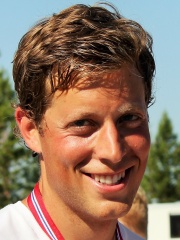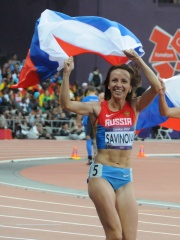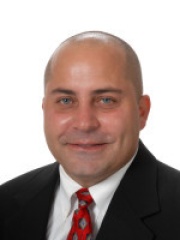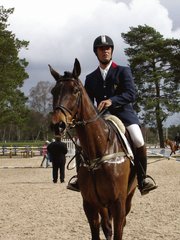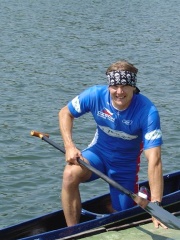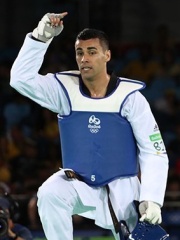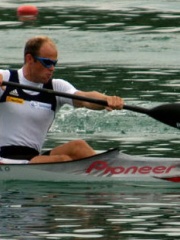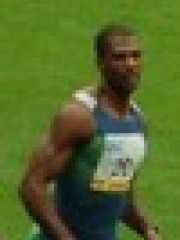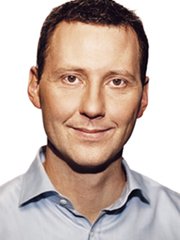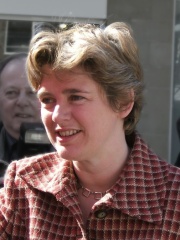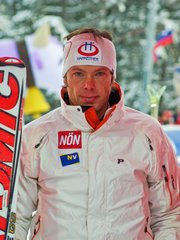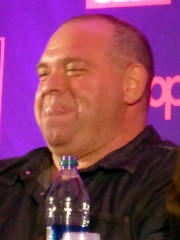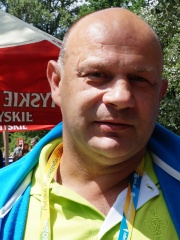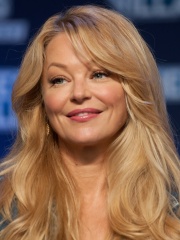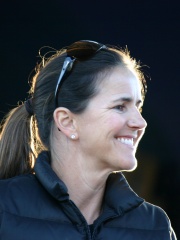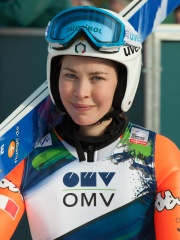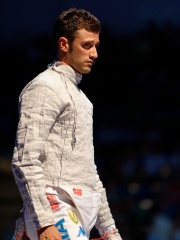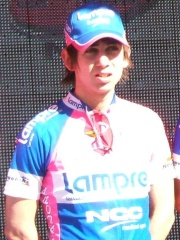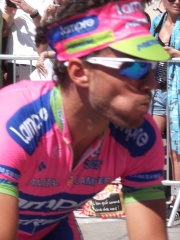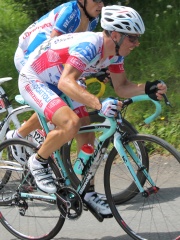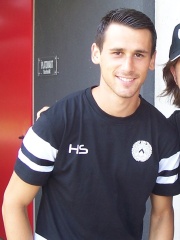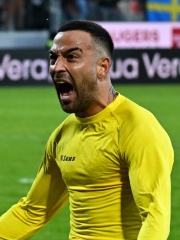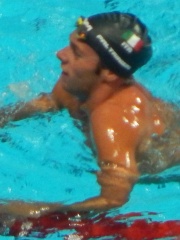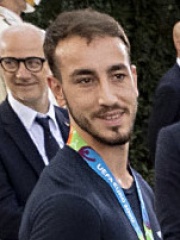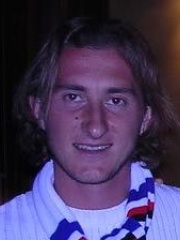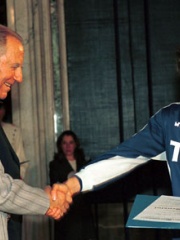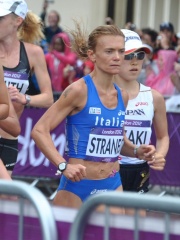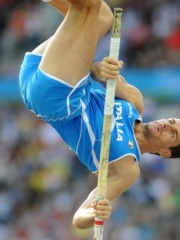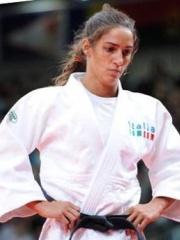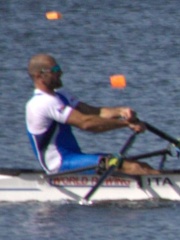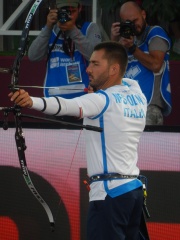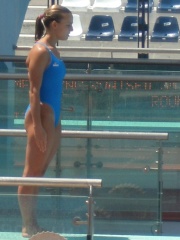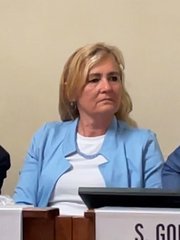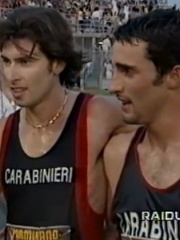ATHLETE
Davide Tizzano
1968 - 2025
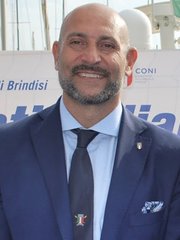
 Davide Tizzano
Davide Tizzano
Davide Tizzano (21 May 1968 – 29 December 2025) was an Italian rower and a double Olympic gold medalist. He won his first gold medal at the 1988 Summer Olympics in Seoul, in the quadruple sculls. Eight years later he formed a team with Agostino Abbagnale, with whom he triumphed in the men's double sculls event. He participated in two editions of the America's Cup, competing with Il Moro Challenge in 1992 and Mascalzone Latino in 2007. Read more on Wikipedia
His biography is available in 14 different languages on Wikipedia. Davide Tizzano is the 4,709th most popular athlete, the 4,991st most popular biography from Italy and the 175th most popular Italian Athlete.
Davide Tizzano is most famous for being an accomplished Italian rower who won a gold medal in the coxless four at the 1996 Summer Olympics in Atlanta. He is also recognized for his success in various international rowing competitions throughout his career.
Memorability Metrics
Page views of Davide Tizzano by language
Among ATHLETES
Among athletes, Davide Tizzano ranks 4,709 out of 6,025. Before him are Lars Helge Birkeland, Mariya Savinova, Mark Lenzi, Hans Peter Minderhoud, Cédric Lyard, and Martin Doktor. After him are Pita Taufatofua, Meike Evers, Alba Cabello, Eirik Verås Larsen, Mabel Mosquera, and Derrick Brew.
Most Popular Athletes in Wikipedia
Go to all RankingsLars Helge Birkeland
1988 - Present
HPI: 41.10
Rank: 4,703
Mariya Savinova
1985 - Present
HPI: 41.10
Rank: 4,704
Mark Lenzi
1968 - 2012
HPI: 41.09
Rank: 4,705
Hans Peter Minderhoud
1973 - Present
HPI: 41.08
Rank: 4,706
Cédric Lyard
1972 - Present
HPI: 41.07
Rank: 4,707
Martin Doktor
1974 - Present
HPI: 41.07
Rank: 4,708
Davide Tizzano
1968 - Present
HPI: 41.06
Rank: 4,709
Pita Taufatofua
1983 - Present
HPI: 41.06
Rank: 4,710
Meike Evers
1977 - Present
HPI: 41.06
Rank: 4,711
Alba Cabello
1986 - Present
HPI: 41.06
Rank: 4,712
Eirik Verås Larsen
1976 - Present
HPI: 41.06
Rank: 4,713
Mabel Mosquera
1969 - Present
HPI: 41.05
Rank: 4,714
Derrick Brew
1977 - Present
HPI: 41.05
Rank: 4,715
Contemporaries
Among people born in 1968, Davide Tizzano ranks 1,097. Before him are Nick Hækkerup, Ruth Kelly, Thomas Sykora, Louis Lombardi, Jan Dydak, and Mark Lenzi. After him are Jinya Nishikata, Vichairachanon Khadpo, Charlotte Ross, Brandi Chastain, Glenroy Gilbert, and Stephanie Storp.
Others Born in 1968
Go to all RankingsNick Hækkerup
POLITICIAN
1968 - Present
HPI: 41.21
Rank: 1,091
Ruth Kelly
POLITICIAN
1968 - Present
HPI: 41.18
Rank: 1,092
Thomas Sykora
SKIER
1968 - Present
HPI: 41.17
Rank: 1,093
Louis Lombardi
ACTOR
1968 - Present
HPI: 41.16
Rank: 1,094
Jan Dydak
ATHLETE
1968 - 2019
HPI: 41.12
Rank: 1,095
Mark Lenzi
ATHLETE
1968 - 2012
HPI: 41.09
Rank: 1,096
Davide Tizzano
ATHLETE
1968 - Present
HPI: 41.06
Rank: 1,097
Jinya Nishikata
SKIER
1968 - Present
HPI: 41.02
Rank: 1,098
Vichairachanon Khadpo
BOXER
1968 - Present
HPI: 40.99
Rank: 1,099
Charlotte Ross
ACTOR
1968 - Present
HPI: 40.99
Rank: 1,100
Brandi Chastain
SOCCER PLAYER
1968 - Present
HPI: 40.99
Rank: 1,101
Glenroy Gilbert
ATHLETE
1968 - Present
HPI: 40.96
Rank: 1,102
Stephanie Storp
ATHLETE
1968 - Present
HPI: 40.94
Rank: 1,103
In Italy
Among people born in Italy, Davide Tizzano ranks 4,992 out of 5,161. Before him are Elena Runggaldier (1990), Luigi Samele (1987), Mauro Santambrogio (1984), Roberto Ferrari (1983), Emanuele Sella (1981), and Kevin Lasagna (1992). After him are Roberto Insigne (1994), Gregorio Paltrinieri (1994), Gaetano Castrovilli (1997), Fabrizio Mori (1969), Riccardo Sottil (1999), and Aimo Diana (1978).
Others born in Italy
Go to all RankingsElena Runggaldier
SKIER
1990 - Present
HPI: 41.15
Rank: 4,986
Luigi Samele
FENCER
1987 - Present
HPI: 41.11
Rank: 4,987
Mauro Santambrogio
CYCLIST
1984 - Present
HPI: 41.10
Rank: 4,988
Roberto Ferrari
CYCLIST
1983 - Present
HPI: 41.09
Rank: 4,989
Emanuele Sella
CYCLIST
1981 - Present
HPI: 41.09
Rank: 4,990
Kevin Lasagna
SOCCER PLAYER
1992 - Present
HPI: 41.07
Rank: 4,991
Davide Tizzano
ATHLETE
1968 - Present
HPI: 41.06
Rank: 4,992
Roberto Insigne
SOCCER PLAYER
1994 - Present
HPI: 41.06
Rank: 4,993
Gregorio Paltrinieri
SWIMMER
1994 - Present
HPI: 41.01
Rank: 4,994
Gaetano Castrovilli
SOCCER PLAYER
1997 - Present
HPI: 41.01
Rank: 4,995
Fabrizio Mori
ATHLETE
1969 - Present
HPI: 41.00
Rank: 4,996
Riccardo Sottil
SOCCER PLAYER
1999 - Present
HPI: 40.99
Rank: 4,997
Aimo Diana
SOCCER PLAYER
1978 - Present
HPI: 40.98
Rank: 4,998
Among ATHLETES In Italy
Among athletes born in Italy, Davide Tizzano ranks 175. Before him are Alessandra Sensini (1970), Valeria Straneo (1976), Giuseppe Gibilisco (1979), Giulia Quintavalle (1983), Simone Raineri (1977), and Mauro Nespoli (1987). After him are Fabrizio Mori (1969), Tania Cagnotto (1985), Diana Bianchedi (1969), Alessandra Perilli (1988), Raffaelo Caserta (1972), and Michele Didoni (1974).
Alessandra Sensini
1970 - Present
HPI: 41.76
Rank: 169
Valeria Straneo
1976 - Present
HPI: 41.49
Rank: 170
Giuseppe Gibilisco
1979 - Present
HPI: 41.47
Rank: 171
Giulia Quintavalle
1983 - Present
HPI: 41.37
Rank: 172
Simone Raineri
1977 - Present
HPI: 41.26
Rank: 173
Mauro Nespoli
1987 - Present
HPI: 41.16
Rank: 174
Davide Tizzano
1968 - Present
HPI: 41.06
Rank: 175
Fabrizio Mori
1969 - Present
HPI: 41.00
Rank: 176
Tania Cagnotto
1985 - Present
HPI: 40.84
Rank: 177
Diana Bianchedi
1969 - Present
HPI: 40.72
Rank: 178
Alessandra Perilli
1988 - Present
HPI: 40.72
Rank: 179
Raffaelo Caserta
1972 - Present
HPI: 40.43
Rank: 180
Michele Didoni
1974 - Present
HPI: 40.34
Rank: 181
